精品2019届高三英语第三次月考试题新人教版 新 版
- 格式:doc
- 大小:209.50 KB
- 文档页数:13
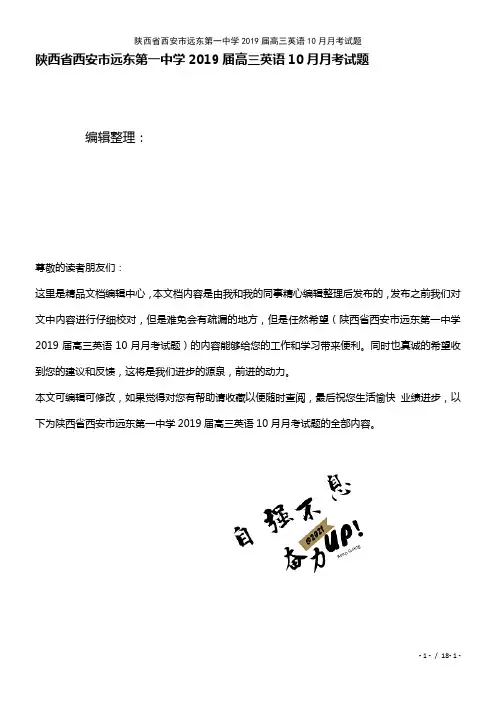
陕西省西安市远东第一中学2019届高三英语10月月考试题编辑整理:尊敬的读者朋友们:这里是精品文档编辑中心,本文档内容是由我和我的同事精心编辑整理后发布的,发布之前我们对文中内容进行仔细校对,但是难免会有疏漏的地方,但是任然希望(陕西省西安市远东第一中学2019届高三英语10月月考试题)的内容能够给您的工作和学习带来便利。
同时也真诚的希望收到您的建议和反馈,这将是我们进步的源泉,前进的动力。
本文可编辑可修改,如果觉得对您有帮助请收藏以便随时查阅,最后祝您生活愉快业绩进步,以下为陕西省西安市远东第一中学2019届高三英语10月月考试题的全部内容。
西安市远东第一中学2018-2019学年度第一学期高三年级10月月考英语试题第一部分:听力(共两节.满分30分)听下面5段对话。
每段对话后有一个小题,从题中所给的A、B、C三个选项中选出最佳选项,并标在试卷的相应位置。
听完每段对话后,你都有10秒钟的时间来回答有关小题和阅读下一小题.每段对话仅读一遍。
1. How will the speakers travel?A. By ferry. B。
By sea bus. C. By train。
2。
Why does the woman believe the weatherman?A. She sees brown grass。
B。
The plants are dying. C. He is always right.3. What are the speakers mainly talking about?A. Birds。
B。
Trees. C. Seasons。
4。
Who is making the noise?A. A baby. B。
A cat. C. A man.5. Which movie will the speakers probably see?A. A or B。
B. Avengers。
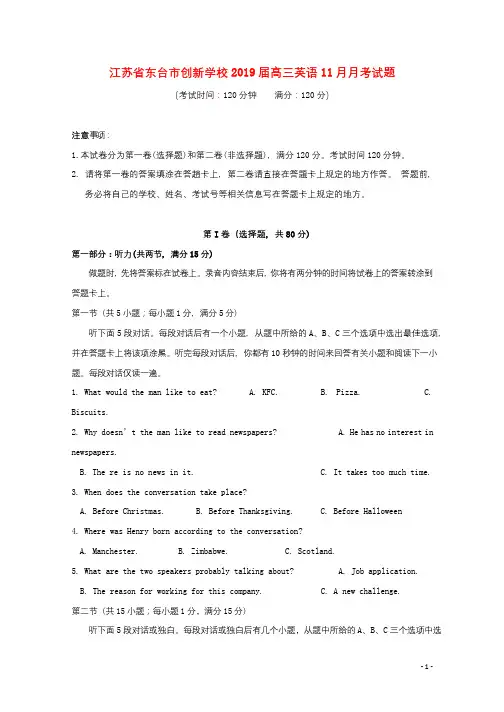
江苏省东台市创新学校2019届高三英语11月月考试题(考试时间:120分钟满分:120分)注意事项:1.本试卷分为第一卷(选择题)和第二卷(非选择題), 满分120分。
考试时间120分钟。
2. 请将第一卷的答案填涂在答趙卡上, 第二卷请直接在答題卡上规定的地方作答。
答题前,务必将自己的学校、姓名、考试号等相关信息写在答题卡上规定的地方。
第I卷(选择题, 共80分)第一部分:听力(共两节, 满分15分)做题时,先将答案标在试卷上。
录音内容结束后,你将有两分钟的时间将试卷上的答案转涂到答题卡上。
第一节(共5小题;每小题1分, 满分5分)听下面5段对话。
每段对话后有一个小题, 从题中所给的A、B、C三个选项中选出最佳选项, 并在答题卡上将该项涂黑。
听完每段对话后, 你都有10秒钟的时间来回答有关小题和阅读下一小题。
每段对话仅读一遍。
1. What would the man like to eat? A. KFC. B. Pizza. C. Biscuits.2. Why doesn’t the man like to read newspapers? A. H e h as n o i nterest i n newspapers.B. The re is no news in it.C. It takes too much time.3. When does the conversation take place?A. Before Christmas.B. Before Thanksgiving.C. Before Halloween4. Where was Henry born according to the conversation?A. Manchester.B. Zimbabwe.C. Scotland.5. What are the two speakers probably talking about? A. Job application.B. The reason for working for this company.C. A new challenge.第二节(共15小题;每小题1分,满分15分)听下面5段对话或独白。
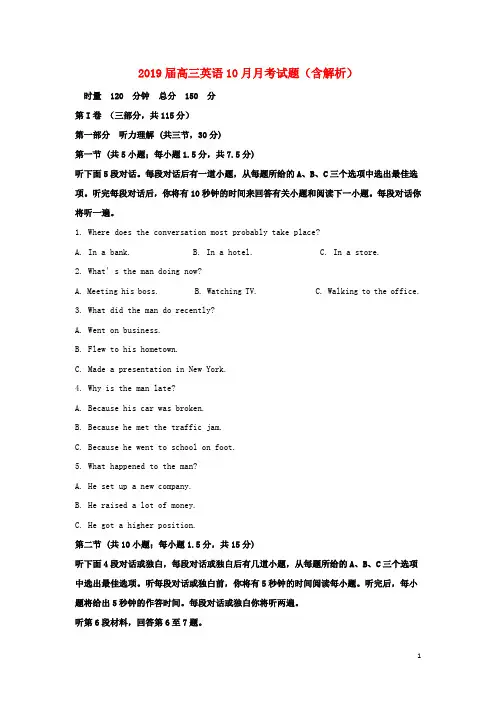
2019届高三英语10月月考试题(含解析)时量 120 分钟总分 150 分第I卷(三部分,共115分)第一部分听力理解 (共三节,30分)第一节 (共5小题;每小题1.5分,共7.5分)听下面5段对话。
每段对话后有一道小题,从每题所给的A、B、C三个选项中选出最佳选项。
听完每段对话后,你将有10秒钟的时间来回答有关小题和阅读下一小题。
每段对话你将听一遍。
1. Where does the conversation most probably take place?A. In a bank.B. In a hotel.C. In a store.2. What’s the man doing now?A. Meeting his boss.B. Watching TV.C. Walking to the office.3. What did the man do recently?A. Went on business.B. Flew to his hometown.C. Made a presentation in New York.4. Why is the man late?A. Because his car was broken.B. Because he met the traffic jam.C. Because he went to school on foot.5. What happened to the man?A. He set up a new company.B. He raised a lot of money.C. He got a higher position.第二节 (共10小题;每小题1.5分,共15分)听下面4段对话或独白,每段对话或独白后有几道小题,从每题所给的A、B、C三个选项中选出最佳选项。
听每段对话或独白前,你将有5秒钟的时间阅读每小题。
听完后,每小题将给出5秒钟的作答时间。
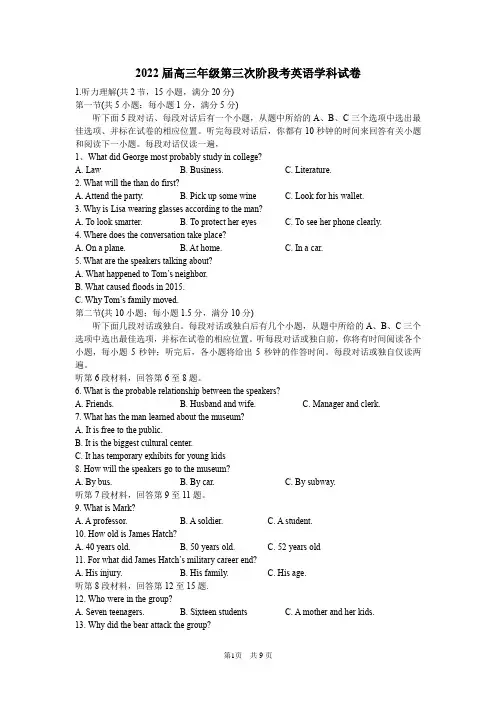
2022届高三年级第三次阶段考英语学科试卷1.听力理解(共2节,15小题,满分20分)第一节(共5小题:每小题1分,满分5分)听下面5段对话、每段对话后有一个小题,从题中所给的A、B、C三个选项中选出最佳选项、并标在试卷的相应位置。
听完每段对话后,你都有10秒钟的时间来回答有关小题和阅读下一小题。
每段对话仅读一遍,1、What did George most probably study in college?A. LawB. Business.C. Literature.2. What will the than do first?A. Attend the party.B. Pick up some wineC. Look for his wallet.3. Why is Lisa wearing glasses according to the man?A. To look smarter.B. To protect her eyesC. To see her phone clearly.4. Where does the conversation take place?A. On a plane.B. At home.C. In a car.5. What are the speakers talking about?A. What happened to Tom’s neighbor.B. What caused floods in 2015.C. Why Tom’s family moved.第二节(共10小题;每小题1.5分,满分10分)听下面几段对话或独白。
每段对话或独白后有几个小题,从题中所给的A、B、C三个选项中选出最佳选项,并标在试卷的相应位置。
听每段对话或独白前,你将有时间阅读各个小题,每小题5秒钟;听完后,各小题将给出5秒钟的作答时间。
每段对话或独自仅读两遍。
听第6段材料,回答第6至8题。
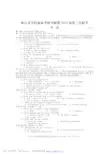
浙江省名校新高考研究联盟2019届第三次联考英语2019.5第一部分:听力(共两节,满分30分)第一节(共5小题;每小题1.5分,满分7.5分)听下面5段对话。
每段对话后有一个小题,从题中所给的A、B、C三个选项中选出最佳选项,并标在试卷的相应位置。
听完每段对话后,你都有10秒种的时间来回答有关小题和阅读下一小题。
每段对话仅读一遍。
()1.What did the man do yesterday?A.He went to basketball practice.B.He went to the office.C.He saw a doctor.()2.What does the man want to do?A.Open a checking account.B.Start a savings account.C.Apply for a credit card.()3.What will the weather be like this weekend?A.Wet.B.Dry.C.Snowy.()4.What’s the relationship between the speakers?A.Interviewee and interviewer.B.Passenger and taxi driver.C.Strangers.()5.What does the woman mean?A.She has to leave.B.She wants more tea.C.She will call the man back.第二节(共15小题;每小题1.5分,满分22.5分)听下面5段对话或独白。
每段对话或独白后有几个小题,从题中所给的A、B、C三个选项中选出最佳选项,并标在试卷的相应位置。
听每段对话或独白前,你将有时间阅读各个小题,每小题5秒钟;听完后,各小题将给出5秒钟的作答时间。
每段对话或独白读两遍。
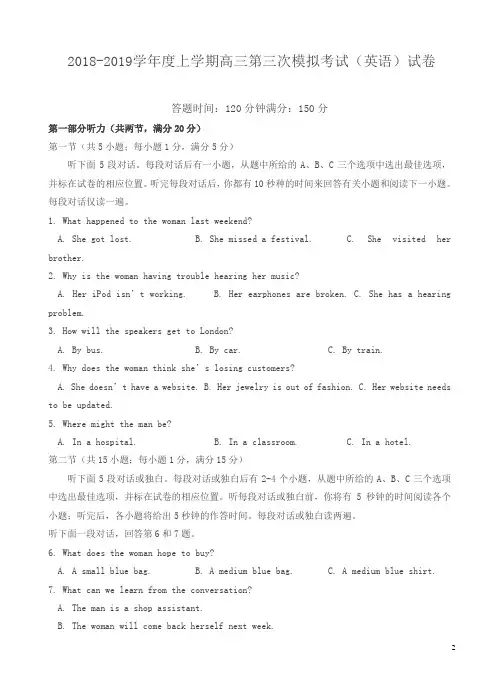
2018-2019学年度上学期高三第三次模拟考试(英语)试卷答题时间:120分钟满分:150分第一部分听力(共两节,满分20分)第一节(共5小题;每小题1分,满分5分)听下面5段对话。
每段对话后有一小题,从题中所给的A、B、C三个选项中选出最佳选项,并标在试卷的相应位置。
听完每段对话后,你都有10秒种的时间来回答有关小题和阅读下一小题。
每段对话仅读一遍。
1. What happened to the woman last weekend?A. She got lost.B. She missed a festival.C. She visited her brother.2. Why is the woman having trouble hearing her music?A. Her iPod isn’t working.B. Her earphones are broken.C. She has a hearing problem.3. How will the speakers get to London?A. By bus.B. By car.C. By train.4. Why does the woman think she’s losing customers?A. She doesn’t have a website.B. Her jewelry is out of fashion.C. Her webs ite needs to be updated.5. Where might the man be?A. In a hospital.B. In a classroom.C. In a hotel.第二节(共15小题;每小题1分,满分15分)听下面5段对话或独白。
每段对话或独白后有2-4个小题,从题中所给的A、B、C三个选项中选出最佳选项,并标在试卷的相应位置。
听每段对话或独白前,你将有5秒钟的时间阅读各个小题;听完后,各小题将给出5秒钟的作答时间。
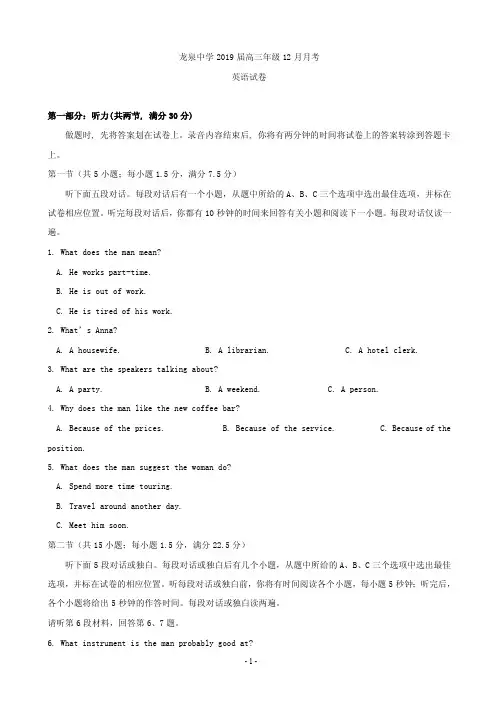
龙泉中学2019届高三年级12月月考英语试卷第一部分:听力(共两节, 满分30分)做题时, 先将答案划在试卷上。
录音内容结束后, 你将有两分钟的时间将试卷上的答案转涂到答题卡上。
第一节(共5小题;每小题1.5分,满分7.5分)听下面五段对话。
每段对话后有一个小题,从题中所给的A、B、C三个选项中选出最佳选项,并标在试卷相应位置。
听完每段对话后,你都有10秒钟的时间来回答有关小题和阅读下一小题。
每段对话仅读一遍。
1. What does the man mean?A. He works part-time.B. He is out of work.C. He is tired of his work.2. What’s Anna?A. A housewife.B. A librarian.C. A hotel clerk.3. What are the speakers talking about?A. A party.B. A weekend.C. A person.4. Why does the man like the new coffee bar?A. Because of the prices.B. Because of the service.C. Because of the position.5. What does the man suggest the woman do?A. Spend more time touring.B. Travel around another day.C. Meet him soon.第二节(共15小题;每小题1.5分,满分22.5分)听下面5段对话或独白。
每段对话或独白后有几个小题,从题中所给的A、B、C三个选项中选出最佳选项,并标在试卷的相应位置。
听每段对话或独白前,你将有时间阅读各个小题,每小题5秒钟;听完后,各个小题将给出5秒钟的作答时间。
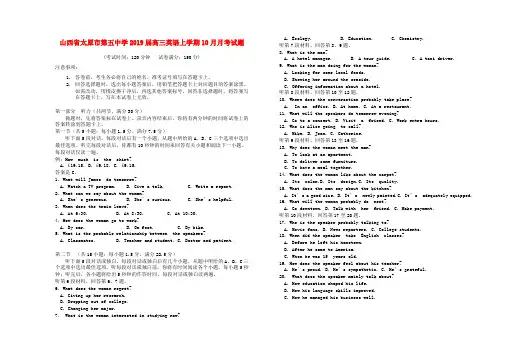
山西省太原市第五中学2019届高三英语上学期10月月考试题(考试时间:120分钟试卷满分:150分)注意事项:1.答卷前,考生务必将自己的姓名、准考证号填写在答题卡上。
2.回答选择题时,选出每小题答案后,用铅笔把答题卡上对应题目的答案涂黑。
如需改动,用橡皮擦干净后,再选其他答案标号。
回答非选择题时,将答案写在答题卡上,写在本试卷上无效。
第一部分听力(共两节,满分30分)做题时,先将答案标在试卷上。
录音内容结束后,你将有两分钟的时间将试卷上的答案转涂到答题卡上。
第一节(共5小题;每小题1.5分,满分7.5分)听下面5段对话。
每段对话后有一个小题,从题中所给的A、B、C三个选项中选出最佳选项。
听完每段对话后,你都有10秒钟的时间来回答有关小题和阅读下一小题。
每段对话仅读一遍。
例:How much is the shirt?A. £19.15.B. £9.18.C. £9.15.答案是C。
1. What will James do tomorrow?A. Watch a TV program.B. Give a talk.C. Write a report.2. What can we say about the woman?A. She’s generous.B. She’s curious.C. She’s helpful.3. When does the train leave?A. At 6:30.B. At 8:30.C. At 10:30.4. How does the woman go to work?A. By car.B. On foot.C. By bike.5. What is the probable relationship between the speakers?A. Classmates.B. Teacher and student.C. Doctor and patient.第二节(共15小题;每小题1.5分,满分22.5分)听下面5段对话或独白。
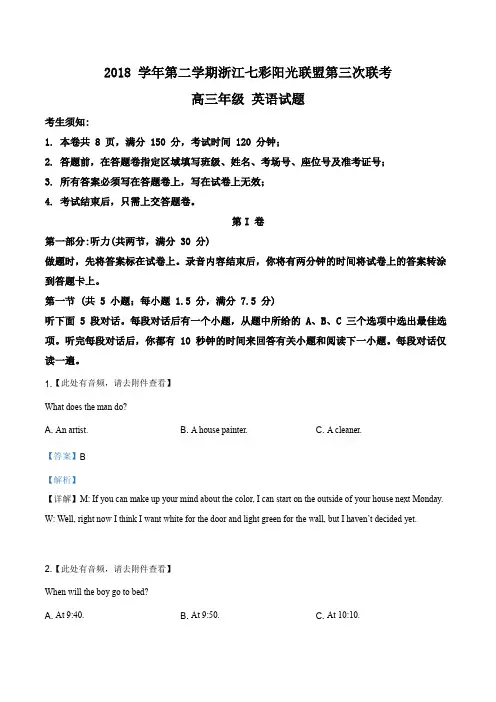
2018 学年第二学期浙江七彩阳光联盟第三次联考高三年级英语试题考生须知:1. 本卷共 8 页,满分 150 分,考试时间 120 分钟;2. 答题前,在答题卷指定区域填写班级、姓名、考场号、座位号及准考证号;3. 所有答案必须写在答题卷上,写在试卷上无效;4. 考试结束后,只需上交答题卷。
第I 卷第一部分:听力(共两节,满分 30 分)做题时,先将答案标在试卷上。
录音内容结朿后,你将有两分钟的时间将试卷上的答案转涂到答题卡上。
第一节 (共 5 小题;每小题 1.5 分,满分 7.5 分)听下面 5 段对话。
每段对话后有一个小题,从题中所给的 A、B、C 三个选项中选出最佳选项。
听完每段对话后,你都有 10 秒钟的时间来回答有关小题和阅读下一小题。
每段对话仅读一遍。
1.【此处有音频,请去附件查看】What does the man do?A. An artist.B. A house painter.C. A cleaner.【答案】B【解析】【详解】M: If you can make up your mind about the color, I can start on the outside of your house next Monday. W: Well, right now I think I want white for the door and light green for the wall, but I haven’t decided yet.2.【此处有音频,请去附件查看】When will the boy go to bed?A. At 9:40.B. At 9:50.C. At 10:10.【解析】【详解】W: Go to bed, Tom. It’s already twenty to ten.M: Aw, Mum, just a few minutes. I’m watching this TV program. It’ll be over soon and I’ll be in bed in 30 minutes.3.【此处有音频,请去附件查看】What does the boy’s new history teacher look like?A. She has red hair.B. she is tall.C. She is quite short. .【答案】B【解析】【详解】M: Oh look! That’s my history teacher over there.W: The one with yellow hair? You always told me your teacher was a short woman with red hair.M: That was the teacher I had before. My new history teacher is tall and wears cool glasses.4.【此处有音频,请去附件查看】Why does the man refuse the woman?A. His car just broke downB. He’ll use his car.C. She can’t drive.【答案】B【解析】【详解】W: Would you mind if I borrowed your car just over the weekend?M: I’m sorry, but it’s just not possible, because I’m going to the countryside this weekend.5.【此处有音频,请去附件查看】Where is the No.1 Hospital?A. Across from a bank.B. On Zhongshan Street.C. At the end of 5th Street.【解析】【详解】W: Excuse me, officer. How do I get to the NO.1 Hospital?M: Cross Zhongshan Street and turn left. Go on one block on 5th Street and you’ll see the building opposite a bank.第二节(共 15 小题;每小题 1.5 分,满分 22.5 分)听下面 5 段对话或独白。
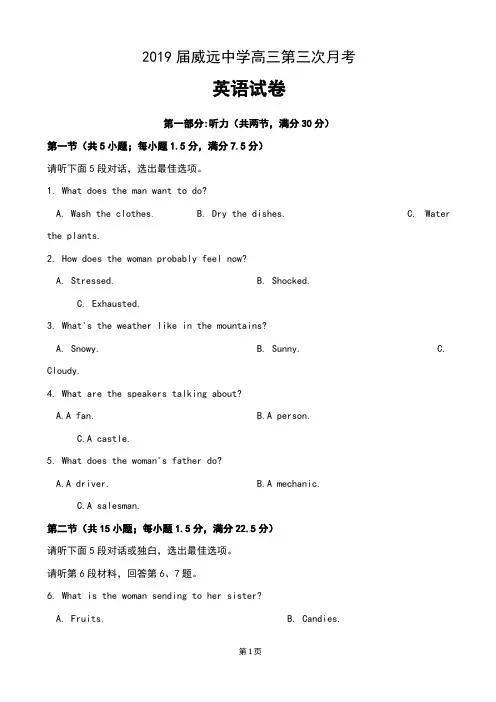
2019届威远中学高三第三次月考英语试卷第一部分:听力(共两节,满分30分)第一节(共5小题;每小题1.5分,满分7.5分)请听下面5段对话,选出最佳选项。
1. What does the man want to do?A. Wash the clothes.B. Dry the dishes.C. Water the plants.2. How does the woman probably feel now?A. Stressed.B. Shocked.C. Exhausted.3. What's the weather like in the mountains?A. Snowy.B. Sunny.C. Cloudy.4. What are the speakers talking about?A.A fan.B.A person.C.A castle.5. What does the woman's father do?A.A driver.B.A mechanic.C.A salesman.第二节(共15小题;每小题1.5分,满分22.5分)请听下面5段对话或独白,选出最佳选项。
请听第6段材料,回答第6、7题。
6. What is the woman sending to her sister?A. Fruits.B. Candies.C. Vegetables.7. What day is it today probably?A. Tuesday.B. Thursday.C. Saturday.请听第7段材料,回答第8、9题。
8. What does the woman say about the X-K Opus?A. It is not available now.B. It is not on sale.C. It is not the latest.9. What type of computer does the man prefer to buy?A. The X-R Opus.B. The X-H Opus.C. The X-K Opus.请听第8段材料,回答第10至12题。
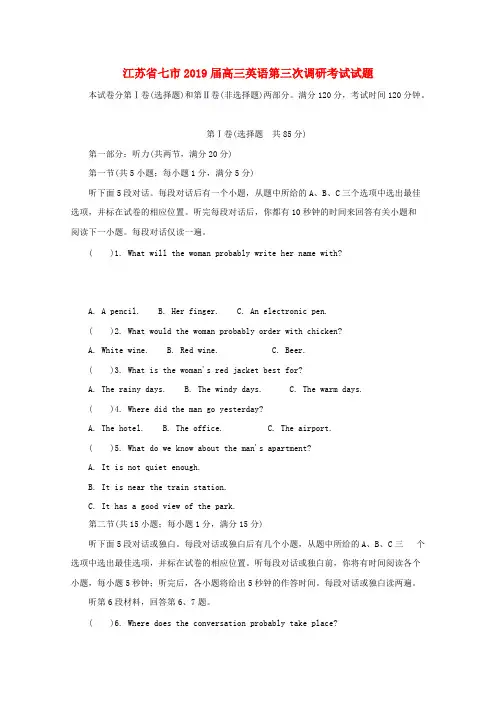
江苏省七市2019届高三英语第三次调研考试试题本试卷分第Ⅰ卷(选择题)和第Ⅱ卷(非选择题)两部分。
满分120分,考试时间120分钟。
第Ⅰ卷(选择题 共85分)第一部分:听力(共两节,满分20分)第一节(共5小题;每小题1分,满分5分)听下面5段对话。
每段对话后有一个小题,从题中所给的A、B、C三个选项中选出最佳选项,并标在试卷的相应位置。
听完每段对话后,你都有10秒钟的时间来回答有关小题和阅读下一小题。
每段对话仅读一遍。
( )1. What will the woman probably write her name with?A. A pencil.B. Her finger.C. An electronic pen.( )2. What would the woman probably order with chicken?A. White wine.B. Red wine.C. Beer.( )3. What is the woman's red jacket best for?A. The rainy days.B. The windy days.C. The warm days.( )4. Where did the man go yesterday?A. The hotel.B. The office.C. The airport.( )5. What do we know about the man's apartment?A. It is not quiet enough.B. It is near the train station.C. It has a good view of the park.第二节(共15小题;每小题1分,满分15分)听下面5段对话或独白。
每段对话或独白后有几个小题,从题中所给的A、B、C三个选项中选出最佳选项,并标在试卷的相应位置。
听每段对话或独白前,你将有时间阅读各个小题,每小题5秒钟;听完后,各小题将给出5秒钟的作答时间。
2019届湖南师范大学附属中学高三月考三英语试卷【含答案及解析】姓名___________ 班级____________ 分数__________一、阅读理解1. While exciting for many, the holidays are stressful for the thousands of families who are struggling in our community.Therefore, our holiday programs coordinate(使协调)food collections and donations to aid the low-income mothers, children and senior citizens. Those who wish to join the challenge can send financial donations to our office: 1355 Oakman Boulevard, Detroit 48238. Other ways you can get involved are:Collect fresh or packaged food or donations for senior citizens. Many schools and business coordinate food drives to support this effort. The donation will be distributed in a massive effort on December 12 at the Rashid Ground. Call313 494 4401.Adopt a senior citizen. We will randomly select senior citizens and provide their contact information for donors. We encourage donors to provide fresh food for a holiday meal, and small gifts, if possible. Donors are responsible for purchasing and distributing the gifts and food. Call 313 494 4424.Adopt a family. Donors can request the names and addresses of families that are enrolled in our food program toprovide gifts and food for the holiday season. They can indicate the size of the family they wish to adopt. All families will be selected randomly. Call 313 494 4413.Participate in our Special Holiday Delivery. Different from past years, when delivery took place at the Gathering Center, volunteers are now expected to meet at the Campus Hall on December 12 to pick up boxes of food and deliverthem to senior citizens. Contact Volunteer Outreach Department at 313 494 4270 to sign up for this special event.1.This passage is written mainly to _________.A. explain how holiday-makers can make their life meaningfulB. show what lonely and miserable lives poor citizens are leadingC. advertize for a company located in Oakman Boulevard, DetroitD. introduce several ways of joining a program for charity work2.If you want to adopt an elderly man and send gifts and food to him, you should call ________.A. 313 494 4401B. 313 494 4424C. 313 494 4413D. 313 494 42703.As a volunteer in Special Holiday Delivery, where should you go todistribute food to the old this year?A. The Campus HallB. The Gathering CenterC. The Rashid GroundD. The office of Volunteer Outreach Department2. On a cold winter day in Denver, I waited in line to see my hero, Jack Canfield, the co-author of the best-selling Chicken Soup for the Soul seriesand the author of The Success Principles. What Jack had become was a versionof what I wanted to be.During his talk, Jack 1 his wallet, pulled out a hundred-dollar bill, and said, "Who wants this?"Hnads shot up in the audience; people leaned forward to see whom Jack would choose. But Iran up the stairs to the stage and grabbed the bill from his hand. He turned to me and said, “Yes, that’sit! Instead of waiting around for opportunities, simply take the initiative and create what we want!”After this week, I asked for his personal e-mail address and sent him e-mail sharing my views and dreams. He kindly e-mailed back simple encouragement such as “Keep thinki ng and playing bigger; it’s much more fun that way. Love, Jack.” Then I got occupied with other things in life and Istopped e-mail Jack.A year later, my dream gradually faded. I had this ideaif I got back in touch with Jack. I e-mailed him again and again but got no response. As I sat down at my computer to check my e-mail for the fifth time in 15 minutes, an inspiration came like lighting: What was I doing? Was I waiting for the prize of life? I knew I neededto do something about all this waiting. I was going towrite a book, which I woul d call “Waiting for Jack”!It all sounded good, but then reality hit. Some nights I cried and wanted to give up. I wrote and rewrote. Even though I could feel the fear, I did it anyway. Fortunately, three years later, Waiting for Jack turns out a best-seller on Amazon!We all have a “Jack” for whom we wait—whether it’s a person, a place or a thing. Now I would like to ask you: what are you waiting for?1.From the first paragraph we can learn that the author _________.A. wanted Jack to autograph her bookB. wanted to be as successful as JackC. wanted to make friends with JackD. wanted to get help from Jack2.It can be inferred from the passage that Jack Canfield is probably a person who ________.A. enjoys playing a lotB. likes showing off his wealthC. seldom takes risksD. welcomes challenges in life3.How did the author lose contact with Jack?A. She and Jack had an argumentB. She had no time to contact JackC. Jack was too proud to get along withD. She was too upset with her broken dream4. What might be the theme of the book Waiting for Jack?A. The disappointment of waiting for her hero JackB. The need to keep waiting for the prize of our lifeC. The importance of taking action to achieve a goalD. The harm of blindly worshipping others as heroes3. The United States does not require business to pay workers who are sick or caring for a new baby. President Obama and some other U.S. lawmakers want to change time-off policies. Supporters say paid leave is the right thing to do. Opponents say it will kill economic growth.In 2014, the United Nations reported that Papua New Guinea(巴布亚新几内亚) and the U.S. are the only two -- out of 185 -- countries in the world that do not offer workers paid time off to care for newborns. However, several state governments and some private businesses in the U.S. have provided the benefits for their workers.Not every American agrees that requiring businesses to pay workers for leave is a good idea.Tricia Baldwin is a business woman. She is secretary and treasurer for her family's company. Her company employs 400 workers. She says giving all of them paid leave would ruin her company. Instead, Reliable Contracting gives paid leave to employees who have stayed with the company for at least five years. She says paid leave is simply another government order that adds more costs to doing business.President Obama supports paid leave for workers. Recently, he proposed a measure called the Healthy Family Act. It would allow workers to earn up to seven paid days of sick leave a year to care for themselves or family members. Mr. Obama also wants Congress to approve a measure giving all workers six weeks of paid leave to have and care for a new baby.U.S. lawmakers who support the proposed measure say paid leave is good for the families and for businesses. Representative Don Beyer says paid leave is an encouragement to parents to return to the job. Mr. Beyer says training a new employee can cost a company a year's worth of income. But U.S. lawmakers who oppose the bill say they do not want to restrict businesses by requiring them to provide paid leave. They are offering a different measure. The Working Families Flexibility Act would allow employees to work extra hours and earn either time off or more pay.1.If a woman in the U.S left to care for her newborn baby, she _________.A. wouldn’t get extra time offB. would get lower payC. would pay for her leave or she will be firedD. wouldn’t get paid leave2.Tricia Baldwin opposes paid leave because it will ________.A. kill the national economic growthB. not be enough to relieve the workers’ burdenC. add more costs to doing businessD. ruin companies rules3.Some of the lawmakers are opposed to the proposed measure to require paid leave because they think ______.A. it encourages parents to return to the jobsB. it will add companies’ cost of training new employeesC. it gives workers more economic guaranteesD. it reduces employees’ working time4. What is the best title for the passage?A. How to reform the Rules of Paid Leave in the U.S.B. Will the U.S Pay Workers for Family Leave?C.Is it Good for the U.S to Pay Workers for Family Leave?D. Why Doesn’t the U.S Pay Workers for Family Leave?4. One in five people carry a ‘smart gene’ variant(变体)linked to long lifespan, bigger forebrains and enhanced mental ability, researchers have found.'We've known for a long time that people lose cognitive(认知) abilities as they age, but now we're beginning to understand that factors like KLOTHO can give people a boost in aging. Genetic variation in KLOTHO could help us predict brain health and find ways to protect people from the diseases that happen to us as we grow old, likeAlzheimer’s disease(老年痴呆症),” said senior author, Dena Dubal of University of California.The KLOTHO gene affects a protein found in the kidneysand the brain that regulates many different body processes. About one in five people carry a single copy of the varian, known as KL-VS,which boosts levels of the proteinand is associated with a longer lifespan and improved heart and kidney function. A small minority, 3% of the population, has two copies, which is linked to a shorter lifespan.In the new study scientists scanned the brains of 422 men and women aged 53 and over who were also tested for the KLOTHO gene. They found that participants with a single copy of the gene variant also had a larger brain region known as RDLPFC, which is especially likely to shrink with age. Loss of neurons in this area may be one reason why older people are sometimes easily distracted and find it difficult to do more than one task at the same time.Researcher Dr Jennifer Yokoyama said, “ The brain region enhanced by genetic variation in KLOTHO is vulnerable(脆弱的)in aging and some mental disease. In this case, bigger size means better function. It will be important to determine whether the structure increase associated with carrying onecopy of KL-VS can offset the cognitive shortage caused by disea se.”People who have one copy of a variant KL-VS tend to live longer and havelower chances of suffering a stroke (中风),whereas people who have two copies may live shorter lives and have a higher risk of stroke.1. What can we learn from the second paragraph?A. People’s cognitive abilities do not decline if people have KLOTHOB. With the clear understanding of KLOTHO, Alzheimer’sdisease can be cured now.C. Genetic variation in KLOTHO could be helpful in treating mental disease in elderly peopleD. Genetic variation in KLOTHO could lead people to suffer from Alzheimer’s disease2.If a person carries two copies of the gene variant, he/she may _______A. have better kidney funtcitonB. have a shorter lifespanC. have a higher level of the protein in his/her bodyD. suffer from some cognitive disease3.The reason why older people’s attention is easily distracted may be that_______.A. they have fewer neurons in the RDLPECB. their brain region is too largeC. they have two copies of the gene variantD. they have more neurons in the RDLPEC4. What does the underlined word “offset” in Para graph 5 probably mean?A. PreventB. BalanceC. KeepD. Promote二、七选五5. 根据短文内容, 从短文后的选项中选出能填入空白处的最佳选项。
第一部分选修6 Unit 3Ⅰ.完形填空(2019沈阳东北育才学校高三上学期二模)There are no ocean waves in St.Louis.We have to drive a long way to get to the ocean.Every summer we put our stuff and ourselves into the car and drive 1,000 miles to reach Vero Beach, Florida.Once we get there, it's all about __1__at the beach.I've wanted to be a __2__for a long time.My mom used to surf when she lived in Florida during college.I __3__ my mom to let me surf, and she promised to find a surfing __4__ for me.He found me instead.One day when my mom was taking an old surfboard to a surf shop for __5__,a surfer __6__ the door open for her and helped her carry the board inside.They started __7__ and she learned he's a surfing __8__.My mom asked him if he had any __9__ working with people with disabilities.He did and told her he would love to work with me.That's how I __10__ my friend, Coach Bill Bolton, in 2019.First Coach Bill taught me the pop-up.I had so much fun surfing with Coach Bill in 2019, __11__ I didn't make it to __12__ on the board.When we went to Florida this summer, I had more surfing __13__with Coach Bill.We worked hard on the sand and in the water.On our third day together we __14__ our surfboards out past a sand bar where small waves were __15__.I came close to standing each time, and on the last __16__ of the day I got up on my feet and stayed up! I was so __17__!So was Coach Bill.We went to the same surfing spot the next day.Guess what! I __18__ so many times and rode wave after wave.Coach Bill called me a “surf goddess”.It was one of the __19__ days ever! I hope my story __20__ you to go surfing or to try something new.I know you can do it.( )1.A.fun B.failureC.trial D.sunlight( )2.A.swimmer B.riderC.surfer D.player( )3.A.reminded B.encouragedC.told D.begged( )4.A.fellow B.coachC.adviser D.driver( )5.A.exhibition B.moneyC.repair D.advice( )6.A.held B.keptC.let D.made( )7.A.greeting B.laughingC.walking D.talking( )8.A.student B.loverC.instructor D.guard( )9.A.trouble B.interestC.record D.experience( )10.A.met B.hiredC.thanked D.rewarded( )11.A.however B.soC.and D.but( )12.A.lying B.floatingC.standing D.moving( )13.A.lessons B.pleasureC.skills D.tasks( )14.A.picked B.tookC.removed D.threw( )15.A.falling B.breakingC.rising D.floating( )16.A.minute B.waveC.try D.part( )17.A.happy B.shockedC.joy D.frightened( )18.A.fell down B.failedC.acted D.got up( )19.A.longest B.greatestC.hardest D.fastest( )20.A.inspires B.pushesC.leads D.influences【主旨大意】作者一家每年都去佛罗里达的维罗海滩去度假。
浙江省杭州高中2019届高三第三次月考英语试题注意:本试卷满分120分。
考试时间120分钟。
答案一律做在答卷上。
第一部分:英语知识运用(共两节,满分30分)第一节:单项填空(共20小题;每小题0.5分,满分10分)1.Mr.and Mrs White are determined to give their children ____ first-rate education, though they are both out of ____ work now.A.a, the B.the, the C.a, / D.the, /2.In the disaster area, plenty of people are short of ____ necessities ____ food, water and medicine.A.expensive, such as B.basic, like C.ordinary, that is D.peaceful, for example 3.People in Sichuan province are determined to rebuild ____ was destroyed in the earthquake. A.that B.which C.how D.what4.Mary ____ he write a letter explaining why he didn’t turn up at her birthday party.A.supposed B.hoped C.expected D.urged5.The poor man stood there, with his hands ____, ____ his eyes upon the dark cave.A.crossed, fixing B.crossing, fixingC.crossed, fixed D.crossing, fixed6.We shouldn’t complain about being poor—many families are much ____ than we are.A.better off B.well off C.worse off D.badly off7.____ learning English through images or through association of ideas, there is also what is popularly known as “situation English”.A.In addition to B.Except C.Except for D.In addition8.---Mary looks down today.What is up?---Well, ____ happened between Mary and me is none of your business.A.wherever B.whoever C.whatever D.no matter what9.---You have won the basketball game.Congratulations!--- ____.A.It’s nice of you to say so B.We are really luckyC.No one else could do it D.Oh, not really10.---Alice looks sad.Did you tell her about the accident?---Yes, but I ____ her just before her final exams.A.shouldn’t tell B.shouldn’t have told C.needn’t tell D.mustn’t have told11.It was not until ____ that ____ to prepare his lesson.A.did his father come in, the boy beganB.his father came in, the boy beganC.did his father come in, did the boy beginD.his father came in, did the boy begin12.____ was expected, only five people turned up at the party, ____ disappointed the hostess very much.A.As, which B.As, that C.It, that D.It, which13.Low-income residents can’t afford to ___ a doctor or purchase medicines when they get sick. A.claim B.consult C.occupy D.capture14.____, all the quarrels came to an end.A.The lost money was found B.Was the lost money foundC.Because the lost money found D.With the lost money found15.The seller would sell the jacket for 70 dollars, but the customer ____ only half the price.A.asked B.charged C.offered D.bought16.The troops ____ on for three days and nights.The soldiers are in great need of rest.A.had marched B.have been marching C.marched D.are marching17.Alone in a deserted house, he was so busy with his research work that he felt ____ but lonely. A.nothing B.anything C.all D.everything18.Creating world peace is a rather difficult goal, ____ calls for efforts of many generations.A.one that B.one C.that D.it19.Try to ____ at least half an hour each day for learning new vocabulary, and you’ll know more words.A.set aside B.take up C.put away D.turn out20.When ____ comes to repairing a machine, I have little knowledge of it.A.that B.one C.this D.it第二节:完形填空(共20小题;每题1分,满分20分)阅读下面短文,从短文后各题所给的四个选项(A、B、C和D)中,选出可以填入空白处的最佳选项。
黑龙江省鹤岗市第一中学2019届高三英语上学期第三次月考试题一.单项选择(共20小题;每小题1分,满分20分)从每题所给的A、B、C和D四个选项中,选出最佳选项。
1. Before you start, it seems that the task is _____________ to be accomplished.A. possibleB. unlikelyC. impossibleD. probable2. You are supposed to _____________ the work, but I haven’t seen it now.A. have been finishedB. be finishingC. have finishedD. finish3. Unfortunately, fifteen-year-old Paige suffers from _______________ rare brain disease, which affects as few as 12 people in the world, and could kill her any day _______________ warning.A. a; withoutB. the; withoutC. a; withD. the; with4. With such a tight schedule, everyone will have to go all out if they _____________the task.A. have completedB. would completeC. will completeD. are to complete5. I _____________ to look upon life as a process of getting.A. was brought upB. was brought inC. was brought outD. was brought forward6. This happens _____________ the children are in two-parent or one-parent families.A. no matterB. eitherC. ifD. whether7. The orphan enjoyed a pleasant evening in the _____________ of the volunteers.A. accompanyB. companionC. companyD. companionship8. He is a professor, _____________ I have been looking forward to becoming.A. whichB. whoC. whomD. that9. He was giving his collection _____________ for free.A. upB. awayC. offD. back10. Greta has always tended to keep her colleagues _____________.A. in a distanceB. in the distanceC. at a distanceD. at the distance11. _____________ you are trying to lose weight to please yourself, it’s going to be tough to keep your motivation level high.A. IfB. WhenC. BecauseD. Unless12. Why not _____________ what you enjoy and do that?A. discoverB. to discover D. discovering D. discovered13. It is a great evening, and definitely _____________ all the hard work.A. worthyB. worthC. worthwhileD. worthless14. The producer comes regularly to collect the cameras _______________ to our shop for quality problems.A. returningB. being returnedC. returnedD. to be returned15. _______________ they got the machine tool repaired.A. At no timeB. In no timeC. At one timeD. In one time16. The way the guests ________ in the hotel influenced their evaluation of the service.A. treatedB. were treatedC. would treatD. would be treated17. The hotel is currently _______________ construction.A. inB. ofC. onD. under18. You can’t _______________ on anybody to keep your secret.A. relyB. trustC. believeD. support19. Some people waste too much water. They don’t believe that it can _____________ some day.A. use upB. run out ofC. be run outD. run out20. That’s the way I look at most of _______________ has happened to me.A. thatB. whichC. whatD. all二.阅读理解(共15小题;每小题2分,满分30分)阅读下列短文,从每题所给的A、B、C 和D四个选项中,选出最佳选项,并在答题卡上将该项涂黑。
2019届高三英语上学期第三次阶段试题(有答案湖南长沙铁路一中)5 绝密★启用前长铁一中stre refills (续杯) n ht r iced breed cffee r tea Gld levelcllect 30 Stars ithin 12 nths and u’re at the Gld level hat is included in the Green level plus♀A free fd r drin ite after anther 12 Stars earned♀Persnalized Gld card21 hich f the flling is a a u can appl fr ebership?A T enter a Starcde fr speciall ared Starbucs’ prductsB T bu a Starbucs card ver the phnec T update the Starbucs’ App fr the fficial ebsiteD T bu a drin at a Starbucs n eeends22 ith the Starbucs’ App, u can ________A change the pricesB earn a Starc pa fr reards D vie current ffers23 ith a Starbucs card f Green level, u ill get ________A a free caeB persnalized Green cardc free in-stre refills D all purchases 15% ffBFr ears I have had n idea hat I have been ding ith life I as a 30-ear-ld laer in Ne r But being a laer as never drea r gal in life I hnestl anted t be a riter I have a great iaginatin and uld rite aazing stries in head But I alas ne that being a riter as never pssible fr e because it as a better financial decisin t sta a laer。
2019高三第三次考试英语试卷第一部分:听力(共两节,满分30分)第一节(共5小题;每小题1.5分,满分7.5分)听下面5段对话。
每段对话后有一个小题,从题中所给的A、B、C三个选项中选出最佳选项,并标在试卷的相应位置。
听完每段对话后,你都有10秒钟的时间来回答有关小题和阅读下一小题。
每段对话仅读一遍。
1. Where does the man want to go?A. To a railway station.B. To a Post Office.C. To the seaside.2. What happened to the woman?A. She woke up late.B. She got to work late.C. She stayed up late.3. What is the woman doing now?A. Baking cookies.B. Making a list.C. Shopping for groceries.4. How does the woman feel about the zoo?A. Sad.B. Impressed.C. Disappointed.5. What are the speakers mainly talking about?A. You ng people lose their jobs easily.B. Young people are too quick in making decisions.C. Young people seldom stay long in the same job.第二节(共15小题,每小题1.5分,满分22.5分)听下面一段对话,回答第6和第7两个小题。
6. When will the man start his new job?A. Tomorrow.B. Next week.C. Next month.7. Why is the man paying for the woman’s lunch?A. She helped him a lot.B. It i s his turn to pay.C. He wants to congratulate her.听下面一段对话,回答第8至第10三个小题。
8. What is Anna’s chemistry grade now?A. B.B. B+.C. D.9. When does Anna’s study group meet?A. After school.B. On the weekends.C. During lunch hour.10. Who is Anna speaking to?A. A studying group member.B. Her teacher.C. Her father.听下面一段对话,回答第11至第13三个小题。
11. How old was Jonathan’s mother when she started doing laundry?A.8 years old.B. 10 years old.C. 16 years old.12. Which temperature will Jonathan use for now?A. Hot.B. Cold.C. Warm.13. Wh at is the “light ” spin cycle used for?A. Jeans and towels.B. Most of Jonathan’s clothes.C. Sheets and pillow cases.听下面一段对话,回答第14至第16三个小题。
14.Which decorations are on the sofa?A. The Christmas ones.B. The Halloween ones.C. The Thanksgiving ones.15.What did the man use to get the box out?A.A pole.B. A chair.C. A ladder.16.Where might the conservation take place?A. In the basement.B. In the bedroom.C. In the living room.听下面一段独白,回答第17至第20四个小题。
17. What does the Golden Rule ask people to do?A. Develop personal rules .B. Respect their families and ancestors.C. Treat others as they wish to be treated.18. Which is Confucius’ teaching?A. Governments should be mora.lB. Husbands should respect wives.C. People should memorize rules of behavior.19. How did Confucius teach lessons?A. Through arguments.B. Through reasoning.C. Through personal examples.20. What does the speaker say about Confucius?A. He used to be even more important.B. He has influenced many cultures.C. He has little effect on people today.第二部分阅读理解(共两节,满分40)第一节(共15小题;每小题2分,满分30分)阅读下列短文,从每题所给的四个选项(A、B、C和D)中,选出最佳选项,并在答题卡上将该项涂黑。
AYou have a choice of three Supafone Mobile Digital access plans: Leisuretime, Executive and Highflier. They are designed to meet the needs of light, moderate and high-volume users. Calls in each plan are charged at only two rates: short-distance and long-distance. You enjoy big savings with off-peak calls. LEISURETIMEYour mobile phone is mainly for personal use. You use your phone to keep family and friends in touch. You don’t want to strain your budget(预算紧张).With this plan you enjoy the lowest monthly access fee and extremely competitive costs for calls. However, a monthly minimum call charge applies.EXECUTIVEY ou’re in business and need to be able to call your office and y our clients whenever the need arises. You value the convenience of a mobile phone but need to keep a close eye on costs.For frequent users: the monthly access fee is slightly higher, but you enjoy the savings of a discounted call rate.HIGHFLIERYou are always on the move and communications are critical. You need to be able to call and be called wherever you are—world-wide.As a high-volume user you pay an access fee of just $60 a month but even lower call rates.21. You will have to pay a minimum amount for call each month for .A. the Leisuretime planB. the Executive planC. the Highflier planD. all of the three plans22. The Executive plan is primarily intended for people who need a mobile phone for .A. their workB. keeping in contact with their familyC. global communicationD. personal use23. It costs for a 50-second short-distance call at 8 p. m., Friday, on Highflier plan.A. 30.2 centsB. 15.2 centsC. 15 centsD. 30 centsBI considered an active social life as basic human necessity. Yet when it dawned on me just how much time I was spending socializing, I realized I may be taking it to an extreme. I calculated that, on average, I was spending 22 hours or more each week on social activities. So, to see what would happen to my work output, health and wellbeing, I decided to try and cut out my social life entirely.I knew, at times, I filled my schedule simply out of fear of missing out (FOMO), but also as a way to shift focus away from my work. For one month, I declined all in-person activities with friends: going out for drinks; dinners; parties and non-work related events, to see if it would make me more productive, improve my focus and career prospects.On day one of the month-long experiment, I had to fight some anxiety over missing out. But as the days passed, I started to relax. I only had one option to consider for Saturday night—to stay home—and this limitation left me more satisfied in my decision. I felt more content working, reading or watching TV.While I found more time to work, I also noticed a change in my overall health. I found myself cooking more at home, doing daily exercise, getting to bed earlier each night, reading, and enjoying moments of rest and boredom throughout the day.Having no social life left me more free time than I’d imagine. Such idle moments are vital for creativity, and mind wandering has been linked to creative problem solving. During the experiment I foundmyself regularly brainstorming new ideas and reimagining existing projects.Of course socialising is an important way to build work contacts. While one month of no social life did not impact my relationship with existing clients, if I had continued, it may harm my ability to build new ones.24. What did the author realize about his socializing?A. It was difficult for him to contact people.B. It’s a necessary part of his life and work.C. He had spent too much time in socializing.D. He should have spent more time socializing.25. How did the author feel on the first day of his experiment?A. He felt anxious that he might be left out.B. He felt more energetic to get clown to work.C. He felt relaxed not having to contact people.D. He felt doubtful whether he could hold on.26. What benefit did the author find to let his mind wander lazily?A. He could have more time with his family.B. He could solve problems in a creative way.C. He could be more concentrated on his work.D. He could free himself from the work contacts.27. What would the author do after the experiment?A. Live a quiet life with his family away from the outside.B. Make a new social life with any possible customers.C. Spare some time regularly for creative thinking alone.D. Continue his work contacts with his customers.CMost of Bangladesh is at or below sea level. Rising seawaters linked to climate change has severely affected the country. High water from storms in coastal areas also adds salt to soil. The land is becoming salty. Crops are less productive and many areas of cropland in the country are becoming unfit for farming. These are big problems for the small country. More than 155 million people live in Bangladesh. Growing crops is the most common way Bangladeshis support themselves.To find a way out, farmers in the country are learning to grow vegetables in so-called “verticalgardens”. The soil in these gardens is better because heavy rains have removed much of the salt.A vertical garden is easy to make. Villagers fill containers with good soil and natural fertilizers. They put the containers on bricks so they are off the ground. They add pieces of the bricks to the soil to help water flow and drain(排水).The farmers cut small holes into the sides of the containers. This permits vegetables with short roots a place to grow. Vegetables with long roots grow on top of the container. One bag of soil can produce up to eight kilograms of vegetables in one season.The farmers also grow vegetables in containers made from large, thin pieces of plastic supported by bamboo. This “vertical tower” measures more than a meter wide. Each of these towers can produce more than 100 kilograms of vegetables. It costs about $12-S13 to build.28. What is mentioned as a big problem for Bangladesh?A. Severe climate conditions.B. Too many people to support.C. Lack of enough fresh water.D. Reduced crop productivity.29. Which mainly makes vegetable growing in vertical gardens successful?A. Places in the soil for roots.B. Heavy rains kept in the soil.C. The good soil with little salt.D. Brick pieces added to the soil.30. What does the underlined word “they” in Paragraph 3 refer to?A. Bricks.B. Fertilizers.C. Villagers.D. Containers.31. What can we infer about the vertical tower?A. It is off the ground.B. It drains very improperly.C. It uses bamboo for containers.D. It is unfit for growing vegetables.DTo err is human. To blame the other guy is even more human.Common sense is not all that common.Why tell the truth when you can come up with a good excuse?These three popular misquotes(误用的引语)are meant to be jokes, and yet they tell us a lot about human nature. To err, or to make mistakes, is indeed a part of being human, but it seems that most people don’t want to accept the responsibility for the problem. Perhaps it is the natural thing to do. The origina l quote about human nature went like this, “ To err is human, to forgive is divine(神圣的).” This saying mirrors an ideal: People should be forgiving of others’ mistakes. Instead, we tend to do the opposite — find someone else to pass the blame on to. However, taking responsibility for something that went wrong is a making of great maturity(成熟).Common sense is what we call clear thought. Having common sense means having a good general plan that will make things work well, and it also means staying with the plan. Common sense tells you that you take an umbrella out into a rainstorm, but you leave the umbrella home when you hear a weather forecast for sunshine. Common sense does not seem to be common for large organizations, because there are so many things going on that one person cannot be in charge of everything. People say that in a large company, “the right hand does not know what the left hand is doing.”And what is wrong with a society that thinks that making up a good excuse is like creating a work of art? One of the common problems with making excuses is that people, especially young people, get the idea that it’s okay not to be totally honest all the time. There is a corollary(推论)to that: If a good excuse is “good” even if it isn’t honest, then where is the place of the truth?32. According to the passage, which of the following seems the most human?A. To search for truth..B.To achieve one’s ideal.C. To make fun of others’ mistakes.D. To criticize others for one’s own error.33. According to the author, what is a sign of a man’s maturity?A. Doing things his own way.B. Making as few mistakes as possible.C. Bearing responsibility for his mistakes.D. Thinking seriously about his wrongdoing.34. What is the author’s opinion about a good excuse?A. Bitter truth is better than a good excuse.B. A good excuse is as rewarding as honesty.C. Inventing a good excuse needs creative ideas.D. Making a good excuse is sometimes a better policy.35. What would be the best title for this passage?A. Truth or Excuse.B. A Mark of Maturity.C. To Blame or to Forgive.D. A Mirror of Human Nature.第二节(共5小题;每小题2分,满分10分)根据短文内容,从短文后的选项中选出能填入空白处的最佳选项,选项中有两项为多余选项。